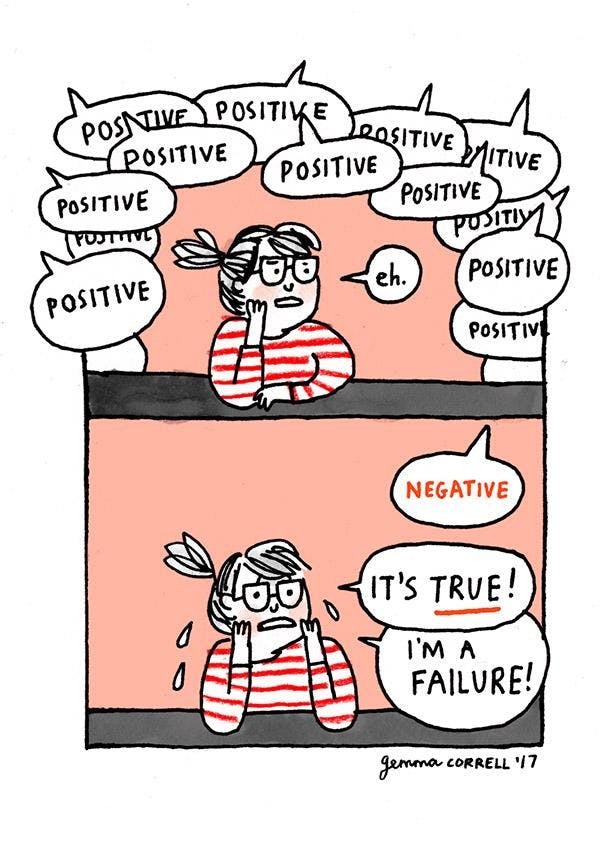Call someone beautiful a thousand times and they won't believe you. Call someone ugly once and they won't forget you. -Anonymous
Have you ever wondered why the world is such a bad place where nothing good ever seems to happen? All the news in the media seems to be bad. The world seems to be heading down the drain with people becoming selfish, arrogant and inhumane.
Or is it? Has the world truly become worse or do you perceive it to be so? Is no good thing ever happening or is the media simply not reporting anything good? Have the people truly become selfish, arrogant and inhumane or have you simply forgotten the good people?
The idea behind this post is to take a stab at explaining why we have a tendency to perceive things to be negative and react, more often than to positivity. And what we can do to control it to some extent. I say control and not mitigate because this is an aspect of ourselves that has evolved over time.
The Best Time to be Alive?
Here's the thing. Despite all the bad news that you keep hearing over the news, the fact is that the world has never known more peace. That's right. Compared to all the time periods, NOW is the best time to live in all of recorded history for most of humanity.
The average number of international conflicts has drastically reduced over the years. Vaccines have been developed for a number of deadly diseases like polio and smallpox whose affliction would have meant certain death in the past. Infant mortality rates have become the lowest in history. Child birth is no longer the number one killer of women as child births have become incredibly less dangerous to women. Illiteracy, all over the world, has reduced and women's literacy rates, the cornerstone of any country's progress, has soared. Here is a list of some statistics if you are looking for data.
There is a good chance that you may not be aware of most of the information in that link. Media has the tendency to report negative news more because bad news sells! Any issue that can cause a threat to us, directly or after some fact twisting, is more likely to be heard and followed more. Such issues engage the people more. And all that directly relates to more advertising revenue. And even if the media reports positive news, it doesn't get registered in our memory as much as negative news does.
Here's an excellent cartoon from Gemma Correll about our belief in the compliments we receive.

Negativity Bias
The reason for this perpetual negativity is a special kind of filter that our brains have, called the negativity bias. This is how Wikipedia defines it.
Something very positive will generally have less of an impact on a person's behavior and cognition than something equally emotional but negative.
I have a theory as to why most of humanity has this kind of bias. I believe that this is a result of the one core directive that is hard-wired into every living being. And that is the need to SURVIVE. This need to survive is what drives most of human needs and desires. And our brains have evolved to evaluate everything first through the lens of danger as it improves the chances of survival. Every incident involving anyone in our lives is put through a primitive threat model to find out if it's dangerous to us. There's a secondary evaluation if it's beneficial to us as well. But an imminent threat is more likely to be acted upon than an imminent benefit. As with any habit, it gets reinforced with time and success.
Another reason is what we, as humans, have been through over the last few millennia. All the death and destruction caused by wars, famines, diseases and disasters (natural and manmade) have made our brains evolve to be constantly on the lookout for any imminent threats that risk our existence.
But over the last few centuries, the massive progress in technology, better diplomacy and many other reasons have contributed to a level of peace that our brains haven't gotten used to. We are no longer under any direct existential threat. But a habit developed over thousands of years of uncertainty is not going to die after a few centuries of relative peace. And that's why even today we are constantly on the lookout for threats that endanger any aspect of our lives (physical, mental, financial etc).
Negativity's Havoc
Perceiving things as threats first has its own problems though. The biggest problem is that you start fearing everything you don't know about. This includes new cultures, experiences and even people in some cases. It serves its purpose by keeping you alive, no matter how ignorant it makes you of things you don't know.
Another common issue is how it affects your ability to withstand criticism. Every time someone (especially if they are not close to you) criticises you, the first thought that strikes you is how you can hit back against them even before evaluating what they are saying is true or not. This is because your brain processes this criticism as a threat and starts taking measures to protect itself. It takes immense practice to hold your peace and force yourself to think about the criticism rather than think of the flaws in their criticism.
In fact if one doesn't find anything invalid in the criticism we try to find faults in everything we possibly can about our critic (supposed attacker). We find faults in the way they talk, walk, eat, dress, etc., trying to find something that we can use to invalidate the criticism. Even if we cannot retort back to the critic (because of seniority, job security etc), we use all this to invalidate the criticism in our heads so that we can be at peace with ourselves.
Fighting Negativity
As with confirmation bias, it's impossible to be completely rid of this. The best we can do to fight it is to keep supplying our brain with positive evidence of how good things truly are. Especially when we feel something bad happening to us.
Like I said before negativity bias can cause us to fear new cultures and people. Travel can help us get rid of this and expand our minds to let us know how unsubstantiated our fears are. Here's a ZenPencils cartoon that illustrates a quote by Mark Twain on travel.
 Every time you feel attacked by someone's words or criticism, don't let your brain paint that person as a threat. Instead try to humanise them by understanding why they are saying that and see it from their point of view. Try to understand that for a lot of people
Every time you feel attacked by someone's words or criticism, don't let your brain paint that person as a threat. Instead try to humanise them by understanding why they are saying that and see it from their point of view. Try to understand that for a lot of people
Criticism is a way of saying that they believe you can do better.
Focus on the word believe, because they believe in you. But most of all remember all the good things that you already have in your life that many others can only dream of. Make a list of all the things you are grateful for and the next time you feel things are not going your way remember this list. Keep reminding yourself of how grateful you are for everything you already have (family, health, friends etc.,) and everything you have already achieved.
I hope next time you feel down you can remember some of the things I've mentioned. I'd love to hear your thoughts and experiences on this.


